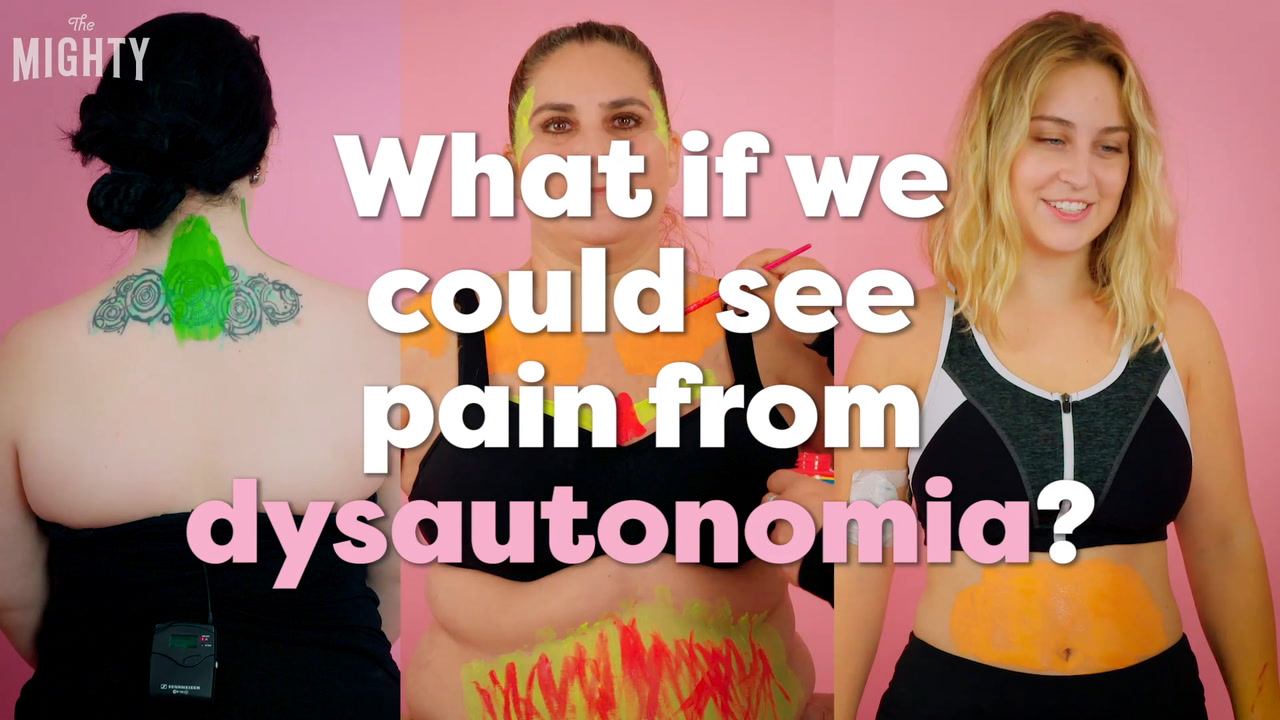3 dysautonomia patients get painted to show their pain areas and talk about what chronic pain really means.
Transcription:
Caryn: We may look healthy but we don’t always feel healthy. But we put on a smile.
What if we could see pain from dysautonomia?
Dysautonomia is a term for several conditions which affect the autonomic nervous system.
Caryn: I fall under the umbrella term of “dysautonomia.”
Natalie: My pain is caused by POTS.
Skye: Postural orthostatic tachycardia syndrome.
Natalie: The pain just radiates out.
Skye: My worst areas are my legs, my back, my stomach and my eyes.
Caryn: It affects just about every part of my body.
Skye: I feel like I just ran a marathon but didn’t drink any water.
Natalie: I have extra heartbeats. It’s almost like my heart will do a little drum solo instead of just beating normally.
Caryn: I’ll get sharp pains in my heart.
Skye: I also feel drunk all of the time, like I’m stumbling everywhere, I can’t remember things.
Caryn: Sometimes it’s a throbbing pain because there’s blood pooling at my feet and my legs.
Skye: I had to relearn how to walk and how to drive.
Natalie: Just squeezing and squeezing until I almost can’t breathe.
Caryn: Sometimes it’s sinus type pains, headaches, migraines.
Skye: POTS is something that people first of all don’t know about, and when they do they don’t take it too seriously.
Natalie: I had a really bad episode where my heart rate reached almost 170 and I went to the ER and the very first thing the nurse said was, “Are you here for drugs?” And it’s like, no, I’m here because I have a heart condition.
Caryn: You get the wrong doctors, sometimes you fall into that category of, “It’s all in your head.” It’s not all in your head, it’s in our body.
Skye: I was told I was being anxious. I was told I was being just depressed, and it’s like I am an adult who knows what she’s feeling.
Natalie: it sounds so stupid and cliché to say, “Don’t judge a book by its cover,” but I mean it couldn’t be more true when it comes to invisible illness.
Skye: I look like a normal person but in reality my body has to do a hundred times more just do an errand or just to have sort of a normal day.
Natalie: Today was a pretty good day. Yesterday I couldn’t even walk up a flight of stairs without having to stop halfway.
Skye: I just wish people would understand that it can really change your life in an instant. You wake up one morning and you’re a completely different person.
Caryn: My issues started with this dysautonomia and then it has spread to other parts of my body, so it’s hard to decipher exactly what ailment it is that’s causing the pain.
Natalie: You still have to just keep pushing and keep fighting through it and you’re gonna have good days and you’re gonna have bad days.
Skye: If you’re telling someone, “I need help” or, “I’m not feeling a certain way,” you should listen to them and try be compassionate because it’s probably not easy.
Natalie: You have to take it one day at a time.
We shouldn’t need to paint our pain so our dysautonomia is taken seriously. Believe us, and be kind.
Visual concept inspired by Elyssa C.

